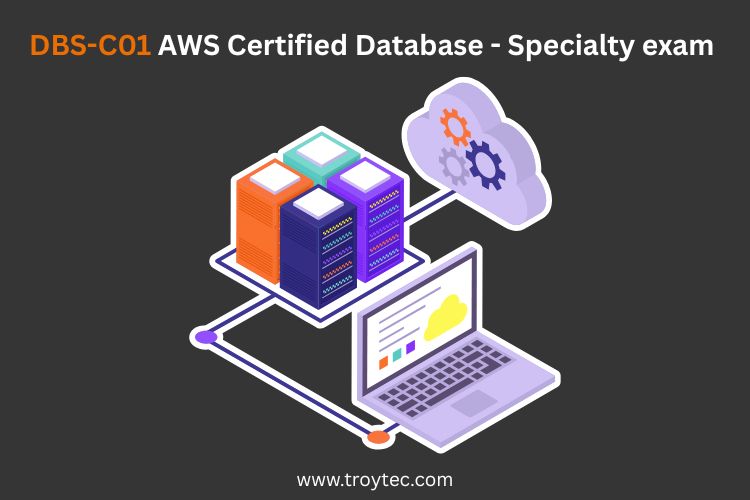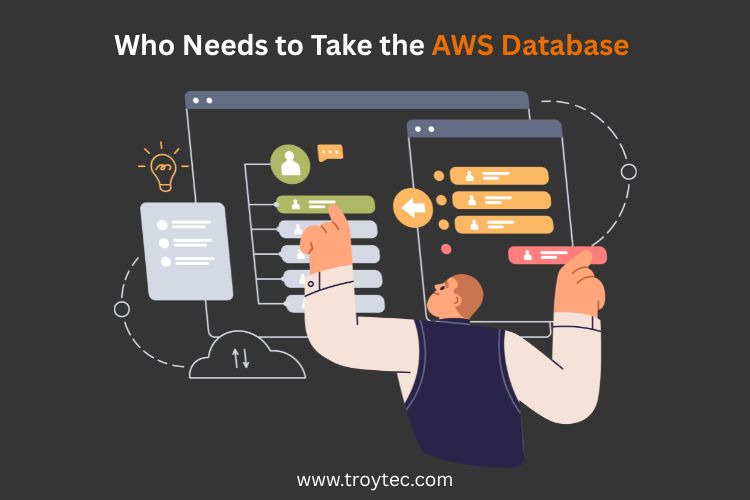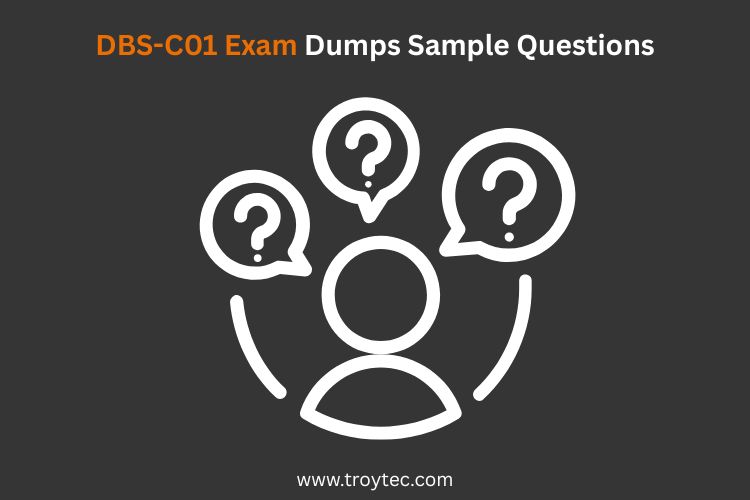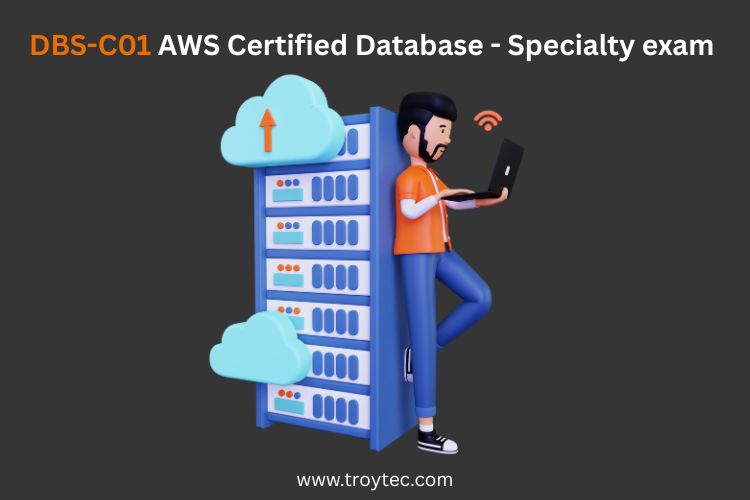There are very few businesses in our data-driven era whose sales or production do not rely on databases. Significant data requirements can arise for businesses of all sizes. Companies are also realizing that they need someone who can help them navigate all of the alternatives as relational and non-relational databases grow in strength and versatility. You may become a valued adviser for a firm that relies on AWS by obtaining the DBS-C01 AWS Certified Database – Specialty exam certification, which certifies that you understand every last aspect of the AWS database service and how to integrate it with certain data workloads.
A more generic certification might demonstrate competence in a wide range of tasks that a database administrator might need to be aware of. However, database specialists who wish to prove their proficiency in designing, creating, and managing purpose-built databases can apply for the DBS-C01 exam. Anyone with an AWS database certification may suggest, create, and manage a unique AWS database solution for every issue a company may have, whether it is relational or non-relational.
Keep reading and exploring this amazing blog to learn how you can pass the DBS-C01 AWS Certified Database – Specialty exam with proven tactics in 2025.
What is an AWS Database?

Among other cloud-based database solutions, Amazon Web Services (AWS) offers AWS databases. Offering a range of database solutions from relational databases like Amazon RDS and Aurora to NoSQL databases like DynamoDB, these services are designed to satisfy various application needs and data storage needs. AWS databases relieve users of the stress of database maintenance by managing processes like server provisioning, patching, backups, and scalability.
What is the DBS-C01 AWS Certified Database – Specialty Exam?
Those who work in database-focused roles are the target audience for the DBS-C01 AWS Certified Database – Specialty Exam. An applicant’s thorough comprehension of databases, including the ideas of design, migration, execution, access, upkeep, automation, monitoring, security, and troubleshooting, is confirmed by this DBS-C01 exam.
AWS claims that the certification is not applicable to any specific position or conventional role within an IT team. Its purpose is to verify a database professional’s thorough knowledge of databases. Professionals who create, move, implement, access, manage, automate, monitor, secure, and troubleshoot databases are the target audience for this advanced certification.
Most importantly, by demonstrating their ability to develop, recommend, and maintain the best AWS database solution for a particular use case, candidates may demonstrate their fluency, confidence, and trustworthiness. As a result, applicants have to match the skills validated by the specialized DBS-C01 certification test with their preparation for the AWS certified database – specialty exam. The following skills of applicants are validated by the DBS-C01 test.
- Recognizing and contrasting the salient characteristics of AWS database services.
- Using AWS services, needs, and requirements are analyzed in order to identify and develop suitable database solutions.
How Much Does the DBS-C01 Exam Cost?
The DBS-C01, which costs $300 to try, is the single test needed to get the AWS Database Specialty. Despite having no formal requirements, it is generally accepted that the AWS Database Specialty is an extremely difficult certification test to complete without prior knowledge or expertise.
The AWS Certified Solutions Architect Associate (costing $150) and the Solutions Architect Professional (costing $300) are the two certifications that are offered earlier in the AWS track. The two Solutions certifications will help you get ready for the AWS Database, but they don’t cover everything there is to know about databases.
Domains Covered in the DBS-C01 Exam
The DBS-C01 test guide is the next thing applicants should focus on while preparing for the AWS certified database specialty exam. Candidates may get the test guide on the official AWS database specialty certification exam page. The test guide is a useful resource that helps applicants prepare by providing them with specific study topics. Additionally, the weighting of specific domains may be included in the test guide for the AWS database – specialty exam. The following domains are included in the AWS Certified Database Specialty DBS-C01 Exam Guide.
- Domain 1: Database Design Specific to Workload (26%).
- Domain 2: Migration and Deployment (20%)
- Domain 3: Operations and Management (18%)
- Domain 4: Troubleshooting and Monitoring (18%)
- Domain 5: Database security (18%)
Candidates might improve their study materials for the DBS-C01 AWS certified database specialization test by means of a close examination of the test guide. Candidates can find the weightings of each domain and the subtopics included within them by referring to the thorough overview of the test guide.
Who Needs to Take the AWS Database Specialty Examination?

Compared to database-focused positions, the most recent AWS specialized certification, the Database specialty, is ideal for IT workers. You may become an AWS Certified Database Specialist with the help of the recently released AWS Specialist certification.
It would be preferable, though, if you first decided if you were prepared for the test and the usage of a DBS-C01 AWS database professional. Although flexibility is not a necessity for AWS certifications, you cannot overlook the importance of experience and expertise.
Please be aware that these items are not required in order to search for the new DBS-C01 AWS Database Specialty test. These insights and experiences, however, can increase your chances of being eligible for the first try.
- A minimum of five years of real-world experience and a complete conceptual understanding of common database systems.
- Two years or more of real-world experience with AWS.
- Showed familiarity and proficiency with relational and NoSQL databases on AWS Cloud and on-premises.
How to Prepare for the DBS-C01 AWS Certified Database – Specialty Exam?
- Make sure you comprehend the material covered by the DBS-C01 test by carefully reading the subtopics.
- Candidates should focus on the appropriate AWS certified database specialty exam guide for the new test.
- Similar to the procedures listed below, the DBS-C01 exam guide may take the shape of suitable actions to fully prepare for the test.
- Review the exam’s goals and outline in detail before moving on to the related subtopics.
- Enroll in any appropriate online certification training provider or the official AWS training program.
- The help for a deeper comprehension of issues is the most intriguing aspect of this DBS-C01 AWS Certified Database – Specialty exam guide.
- Instead of just memorizing the answers, candidates should read each question carefully in order to prepare.
- Candidates should learn more about how to appropriately and accurately answer questions.
- To improve your answers to multiple-choice questions without sacrificing accuracy, you may learn how to answer exclusion.
- Prior to any certification exam, never undervalue the importance of practice exams.
- The last piece of advice for DBS-C01 test preparation is to seek help from research groups and communities. Peer support might be helpful as you will be taking a new certification exam.
- To create course schedules, AWS collaborates with outside companies that focus on certification and testing. The vendor adds support for other languages over time, although the first versions are exclusively available in English.
- Tests are offered at different times, in different forms, and at varying costs. Candidates select the alternatives that work best for their budget and schedule.
- AWS services are developed with a high level of knowledge, and more effort has to be made to enhance its training and certification initiatives.
DBS-C01 Exam Dumps Sample Questions

Before you buy our premium DBS-C01 exam dumps, take a review of some of the sample questions from our dumps. This will help you better understand why you must buy our premium DBS-C01 exam dumps to pass the exam quickly.
Question 1:
A multinational digital advertising firm uses browser metadata to show consumers relevant pictures, sites, and connections in a contextual manner. Multiple events that require separate storage can be produced by a single page load. An event’s average size is 10 KB, while its maximum size is 200 KB. To give targeted recommendations, the user’s browsing history must be queried each time a page loads. The advertising firm anticipates that users in the US, Europe, Hong Kong, and India will view more than 1 billion pages every day. The metadata’s structure changes based on the event. To guarantee that viewers have a positive viewing experience, the browsing information must also be written and read with extremely low latency.
Which database option satisfies these conditions?
- DocumentDB on Amazon
- Deployment of Amazon RDS Multi-AZ
- The global table for Amazon DynamoDB
- Aurora Global Database on Amazon
Question 2:
A mobile app with an Amazon DynamoDB backend database is being used by a firm. The app’s activity fluctuates throughout the day in unexpected ways. The operations team of the business observes that DynamoDB read and write requests are throttled at different times, which detracts from the client experience.
Which fix will eliminate the throttling problem without needing modifications to the application?
- In a backup AWS region, add a DynamoD3 table. Fill up the extra table with DynamoDB Streams.
- Install a cluster of Amazon ElastiCache in front of the DynamoDB table.
- Use the DynamoDB table’s on-demand capacity mode.
- Utilize DAX or DynamoDB Accelerator.
Question 3:
An existing parameter group linked to a production Amazon RDS with SQL Server Multi-AZ DB instance was altered by a database specialist. The modification is linked to a static parameter type that regulates the maximum number of user connections permitted on the organization’s most important RDS SQL Server DB instance. In order to lessen the impact on users, this modification has been authorized for a particular maintenance window.
How is the parameter group modification for the DB instance to be applied by the database specialist?
- Choose to implement the modification right now.
- Let the specified DB instance’s preset RDS maintenance window determine when the modification is implemented.
- During the authorized maintenance time, manually apply the modification by restarting the database instance.
- Restart the backup instance of Multi-AZ DB.
Question 4:
An Amazon RDS DB instance is defined by an organization’s AWS CloudFormation stack. The business loses current data from the DB instance when it inadvertently deletes the stack. To lessen the possibility of future unintentional data loss from the DB instance, a database professional must modify the CloudFormation template for the RDS resource.
What steps should the database professional take in order to fulfill this requirement? Select three.
- Assign True to the DeletionProtection property.
- Select True for the MultiAZ attribute.
- Assign True to the TerminationProtection property.
- Put False in the DeleteAutomatedBackups attribute.
- Put “No” in the DeletionPolicy property.
- Select Retain as the DeletionPolicy attribute.
Question 5:
An Oracle database on-premises has been converted to Amazon Aurora PostgreSQL by a database specialist. Both the data and the schema have been successfully moved.
Additionally, database maintenance cron jobs written in Python were being executed on the on-premises database server to carry out operations like data cleansing and data export generation. According to the records for these jobs, the majority of them were finished in five minutes, while some took up to ten. Aurora PostgreSQL requires the setup of these maintenance routines.
How can the database specialist plan these tasks to ensure high availability and less maintenance for the setup?
- To conduct the maintenance tasks according to the necessary timetable, create cron jobs on an Amazon EC2 instance.
- Establish a connection with the Aurora host and set up cron jobs to execute the maintenance tasks on the specified timetable.
- Use Amazon CloudWatch Events to plan the maintenance tasks and create AWS Lambda functions to execute them.
- Use the Amazon CloudWatch job scheduling plugin to create the maintenance task.
Conclusion
Perhaps you’re attempting to demonstrate your database expertise in order to get a promotion or a raise rather than learning new database management abilities. The DBS-C01 AWS Certified Database-Specialty test tests your knowledge of all AWS database solutions in a demanding and comprehensive manner. Because of this, it’s ideal for confirming your proficiency with databases.
The preparation you will perform for the DBS-C01 exam AWS Database will eliminate any last doubts you may have about database solutions or AWS offers. Furthermore, if you possess it, you will be positioned at the top of the list of database or solutions engineers.
FAQs (Frequently Asked Questions)
How Challenging Is The Specialist DBS-C01 Test For The AWS Certified Database?
One of the most hard AWS certifications is the DBS-C01 AWS Certified Database Specialty – exam. The knowledge of databases, including design, migration, deployment, automation, observing, security, and troubleshooting, is validated by this certification.
What Is The Cost Of The DBS-C01 Test?
The cost of each Amazon AWS certified database specialist (DBS-C01) is around $300.
What Is The AWS Certified Database Specialty Passing Score?
Your exam results are shown as a score on a scale from 100 to 1,000. A passing score of 750 is required. Your score specifies whether you passed the DBS-C01 test and how well you did overall.
How Can I Extend My DBS-C01 AWS Test By Thirty Minutes?
- Prior to enrolling for your exam, take these actions:”
- “Go to your Account” should appear.
- After choosing “Request Exam Accommodations,” select “Request Accommodation.”
- Choose “ESL +30 MINUTES” from the “Accommodation Type” menu.
- Choose “Create.”

